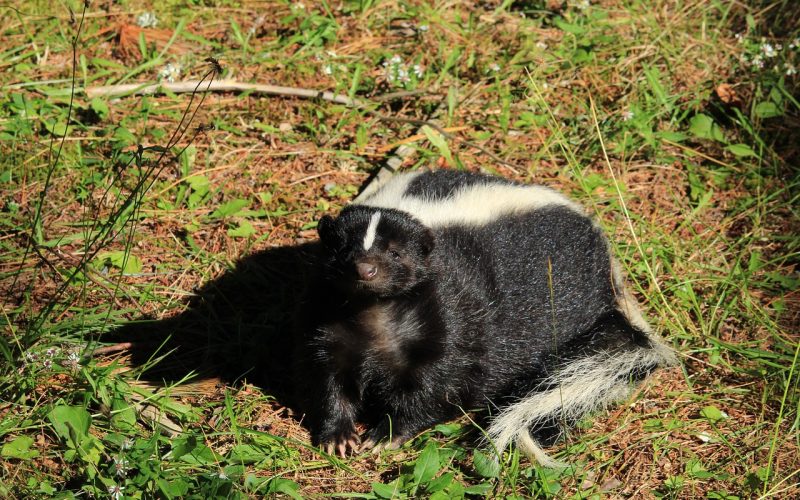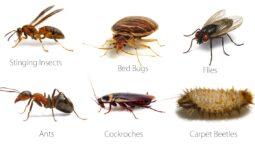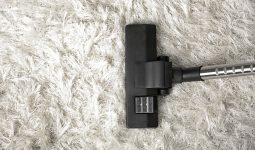Skunks are usually non-aggressive and can be beneficial in the area they inhabit. However, they can quickly become a nuisance, too.
If they decide to make their burrow and have babies on your property, the only thing you will care about knowing is just how to get rid of skunks under the house, patio, or shed before they start to spray you (or your pets) and become more than a nuisance.
Nocturnal and relatively shy, skunks are not often seen, but they can be smelled! Although the black and white creatures are not innate antagonists, they will spray people or animals with their awful N-butyl mercaptan (skunk spray) if they feel threatened, leaving behind a horrible smell that can linger for days.
Even if they don’t make a big stink, skunks invade your garden and mess up your garbage.
The bottom line is that Humans have a hard time living with these cute but stinky creatures.
If you suspect a skunk has taken up space under your house or surroundings, keep reading as we’ll explain how to get rid of skunks under the house and anywhere they frequent your surroundings.
Fortunately, there have come to be many ways to get skunks out of your home naturally and humanely.
You can eliminate skunks that have taken up residence on your property with several methods of prevention and repelling.
The best option is to make the area uninhabitable by covering prime den locations and deterring them with scents such as ammonia, mothballs, pepper, urine, or spray repellents.
In this article, we will show you many techniques for getting rid of skunks under the house or anywhere else they may have taken over and keeping them from coming back.
How Do You Know It’s a Skunk?
Almost anyone in North America can recognize a skunk is around because it gives off a horrible smell that travels miles and sticks to your clothes like lint. However, if the smell of the skunks is undeniable, its appearance is just as much.
A skunk is usually completely black, with a single white stripe running from the top of the head to the tip of the tail, but skunks can be brown/chocolate in color or completely white.
These creatures tend to be very shy and like to stay away from areas densely populated with people or other animals.
Nevertheless, skunks also need to eat and find a place to live, which may be one reason they find shelter on your property.
Although the pungent smell of a skunk is in no way harmful, it is revolting and specifically designed to deter a potential predator.
A skunk may not be particularly interested in you or your pets, but they are in the vegetation in your yard or the shelter under your house.
Skunks dig holes in your lawn and garden and have been known to destroy any food in your garden, brush, and eat the bark off your trees.
Skunks will also dig their way under your house, porch, or shed to breed. If you have a skunk infestation around your home, you can be sure it will reproduce and die on your property.
And if they eventually die in a hard-to-reach place, they will create a horrible smell that will linger and be almost impossible to get rid of.
Are Skunks Dangerous?
Before we discuss how to get rid of skunks under the house, let’s first answer a common question: How dangerous can a skunk be? Skunks are not dangerous creatures.
Skunks are generally not aggressive. They are peaceful little fellows, but their reputation for being smelly is well deserved.
They can help control grubs and pests, but having one living on your property is not a good prospect. If a skunk has sprayed you or your pet, you probably won’t want that again soon.
However, they are also one of four wild animals that primarily transmit the rabies virus. A rabid skunk may stagger, circle, have paralyzed limbs, or act aggressively. Call your local animal control center or wildlife rehabilitator for help if you notice a rabid skunk.
What’s the Best Way to Get Rid of Skunks Under the House?
The best and most efficient way to remove skunks from your property is to prevent them, and that depends on where they are and how you want to manage them.
For example, maybe you have an unlimited budget for repellents or want to deter these animals without spending a penny.
To get started, check the following:
- Eliminate food sources
- Cover the trash bin
- Never leave pet food out overnight.
- Cover all window wells
- Keep your yard well-lit
- Avoid overwatering the lawn
Prevention
The best way to get rid of skunks under the house is not to attract them in the first place. Remove their food source.
Skunks are opportunists, and insects may be their favorite food, but the opportunistic animal will eat almost anything. It completely cuts off their food supply, and they probably won’t stick around.
Ensure your garbage cans are airtight and secure in your garage or under your porch.
Pick up any litter you may have in your yard, make sure your pet food is inside, and feed your pets inside.
You should also pick up fallen and rotten fruits and vegetables. If you like to feed the birds around your house, be aware that feeding the birds can sometimes be a little messy.
Skunks, on the other hand, love bird seed, so clean it up when it gets litter on the ground, especially before nightfall.
If you eliminate their food source, they won’t be able to live near you. Finally, Skunks like to dig for grubs in an overwatered garden.
This happens because moist soil conditions push grubs closer to the surface. Keeping your lawn in good condition and not too wet could prevent a skunk encounter.
How to Get Rid of Skunks Under the House Deck, Shed, or Porch
Opportunistic animals, they say, are skunks, which often create dens in easily accessible places.
In addition to sealing off these areas, you can use natural and humane methods to eliminate Skunks for good.
The following list includes many options for keeping Skunks away from your property.
1. Install a Wire Mesh fence
As we already know, skunks do not like places populated by people or other animals, which is why they make their dens under concrete slabs, porches, and crawl spaces around houses.
However, you can always close hiding places that may seem attractive. Install underground wood panels or wire mesh fences around the deck, shed, or under the house.
Fill in any voids or spaces that Skunks are likely to enter. You can also use a fence, sheet metal, concrete, wood, or chicken wire.
2. Use Repellents
There are several repellents available that claim to help get rid of skunks under the house or prevent them from approaching your property.
Most repellents are ineffective and must be reapplied several times to be effective. Skunks have excellent hearing and very sensitive noses, much more so than humans.
This is why many skunk repellents contain pungent ingredients. Product developers know skunks’ sense of smell is usually keen, so they ask, “What smell do skunks hate?” and use the answers for pest control.
However, repellents such as ammonia, mothballs, predator urine, and Tabasco work well for Skunks.
Sprinkle Nearby Kitty Litter
Cat litter is a mild repellent you can place near and inside a skunk’s den to get them out. Be sure to put the litter on only one side of the den, so the animal can walk through and leave the area.
When it is noticed that the skunks are gone, fill the hole with leaves or put up a wire fence in front to keep them from coming back.
Use Cotton Balls Soaked in Ammonia
Ammonia has a pungent smell that deters Skunks. Spray rags or cotton balls with ammonia and place them near the entrance to their den or under your porch to prevent Skunks from making their den.
If you think the smell is too strong, put the rags or cotton balls in a plastic bag first.
Add Mothballs to Your Garden
Mothballs are another effective way to get rid of skunks under the house. They have a strong odor that deters skunks.
Spread a handful of mothballs under your porch or patio to keep them away, then seal the area with wire mesh. The mothball smell will disappear in a few weeks.
This method also works well if you have skunks in your garden, where they can hang out and feast on pollinators. However, you should keep mothballs away from children and pets.
Apple Cider Vinegar in a Plastic Bag
Just like the ammonia method, apple cider vinegar produces a strong odor that repels Skunks.
Soak cotton balls or rags in apple cider vinegar and place them in a plastic bag.
Place the bag under your porch or shed or near the den entrance to keep skunks out.
Predator Urine Spread
Urine from natural predators such as foxes and dogs can deter Skunks. If you have a dog, you can encourage it to urinate near the den under your house or around your yard.
You can also buy products containing urine to spray around the perimeter.
Never buy predator urine to deter skunks. These products are usually made inhumanely and do not repel skunks well.
Use the Power of Spicy Spray
You can always make a spicy spray to repel skunks. Most people just make a solution with cayenne pepper, tabasco sauce, or jalapeño and spray it on the plants or around the perimeter to signal pests to stay away.
A simple preparation recipe involves cooking the chopped yellow onion and the chopped jalapeño with a spoonful of cayenne pepper and two liters of water.
After 20 minutes, strain the solution and put it in a spray bottle. The mixture lasts up to five days and effectively eliminates skunks under the house or around the garden.
Try Pepper spray
Similar to spicy spray, pepper spray is another effective repellent around your garden, trees, or den. It repels Skunks and other wildlife, such as squirrels.
Make homemade pepper spray from water and black pepper. Place the solution in any spray bottle to apply to plants or your garden. The scent is excellent for keeping Skunks away from your garden. However, spicy sprays generally work best.
Scatter Citrus Peels
Citrus fruits such as lemons and oranges give off a pleasant and fresh aroma for humans. However, the extraordinarily acidic and pungent smell is a natural repellent that animals, including Skunks, despise.
It can also be a home remedy for getting rid of Skunks under the house and around your property. You can spread citrus peel under the patio or porch. You can also cut out the peels and scatter them around your property or where they are frequented.
Remember that they lose their scent as they dry out, so you must replace them every few days.
3. Install Motion-activated Sprinklers
The motion-activated sprinkler is designed to turn on automatically. Similarly, critter sprays are activated when an animal gets too close.
Critter sprinklers are a surefire way to keep skunks away from your property. Place them near areas where Skunks might want to make a den.
4. Install Predator Deterrent Lights
Since Skunks are nocturnal, they tend to avoid bright lights. Installing predator deterrent lights or a motion-activated lighting system in your yard can make the area less attractive. Solar lights are also a great energy-saving option.
The main disadvantage of these lights is that they can attract insects that like bright light, such as moths or crickets.
A motion sensor that only activates when a creature approaches could help without having to leave the lights on throughout the night.
5. Use an ultrasonic Skunk repeller
Another humane option for getting rid of Skunks under the house is to use an ultrasonic animal repellent.
They are solar-powered tools that eliminate pests by producing ultrasonic sounds, high-frequency alarms, and flashing LED lights to annoy animals. Use it to keep pets out of your yard or reduce the risk of burrowing into your property.
6. Adopt a Cat or Dog
The scent of another animal, such as a cat or dog, could keep pests away from your property. However, many Skunks are accustomed to living among humans and other animals.
This method doesn’t work well if you live in the city, where many Skunks rely on their stinky spray to avoid disturbances.
7. Catch and Relocate
If you live in an area where it’s legal to trap live animals, consider installing a spring trap to keep skunks away from your home.
You can buy or rent one at many local hardware or garden centers.
You can set up a large cage trap in an open space, or somewhere they like to visit often.
Use cat food, peanut butter, fruits, vegetables, canned marshmallows, or sardines as bait.
Also, dirt the trap a little to mask the smell of metal and chemicals for the newly bought trap, and camouflage it by throwing leaves and dirt on it.
When using a trap for the first time, it is best not to set it just yet. Let the Skunk take the bait 2-3 times so he thinks he is safe. After setting your trap, check it daily to see if you have caught any.
A captive animal left alone in the open can become ill over time or even die. This is not the purpose of the trap in the first place.
You can also get a trap door that you can place in front of their burrow that will allow them to exit but not enter.
After trapping the Skunks, take them to a nice wooded area at least 10 miles from your home and patch any holes they would have made. You can also try to fill the holes they dig in your garden to prevent them from coming back.
However, live trapping is mostly illegal in many states. Contact your local wildlife department if you are unsure of the laws where you live.
Also, note that catching a Skunk exposes you to being sprayed or bitten. You can also use a blanket to cover the trap during movement.
The raccoon trap is ideal for Skunks. It has a spring-loaded metal door that closes after the animal enters.
To prevent injuries, the edges of the inside of the cage are also smooth. The trap even comes fully assembled and ready to use, allowing you to move nuisance animals around quickly.
When to Call a Professional
Do you think all the Skunk repellents that work for other people do not affect the seemingly impenetrable Skunks that live in your home? Have you tried everything, from removing food sources to mothballing Skunks and putting up fences, but to no avail?
Maybe it’s time to call in the experts. Professional Skunk removal costs are naturally higher than basic DIYs, as you are paying for their equipment and expertise.
This will be the last option if you’ve tried everything but don’t see significant improvement. You should also consider this if you have an aggressive Skunk.
It would be best if you never attempted to capture (note: Skunk trapping is not legal in all states), let alone handle, a Skunk that appears to be in a state of war.
There are two common reasons why these sweet creatures change temperament: either a mother is protecting her young or the animal is infected with the rabies virus.
Either way, you need the help of a reputable pest control company or local wildlife control agency. They know how to effectively and safely remove a Skunk and its young.
They have the necessary protective equipment and training to handle a Skunk suspected of being rabid. Remember that your safety and your family are well worth the cost of pest control services.
Be persistent; your outdoor space will eventually have the sweet smell of success it deserves!





